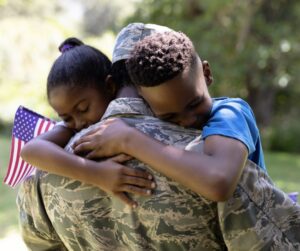Supporting Military Children: Understanding the Emotional Cycle of Deployment

Imagine receiving one little piece of paper that changes your entire family dynamic and you have no control over the situation. Now imagine you are a child who learns bits and pieces of what is about to happen through direct and indirect conversations, but does not fully understand what is going on. This is the reality of nearly every military child in the United States as they experience a caregiver receiving orders for deployment. As a caregiver or provider of a military child you may be wondering how you can best support a child during this difficult and emotional time. Understanding the emotional cycle of deployment and how it impacts a child is an important aspect of providing support.
The emotional cycle of deployment is broken into seven stages with general timeframes and different emotional reactions that could be experienced (Moyses, 2012). For purposes of this blog we will be focusing on the viewpoint of the child and how a caregiver can respond to common emotional reactions.

1. Anticipation of Departure- This begins right around the time the service member receives orders of an impending deployment. You may see an increase of emotions, to include worry and exhaustion. Use age appropriate honesty and continue to have open conversations with children while welcoming questions. This is also a good time to develop care plans and include older children to create a sense of security. Parents, take time to create memories and capture pictures to make a deployment scrapbook with children.
2. Detachment and Withdrawal- This stage begins approximately a week before deployment, with the most heightened state about 48 hours prior to departure. Emotions may cause an increase in arguments and detachment to protect hurt feelings, particularly in children who have experienced multiple deployments. Continue to provide open communication and discuss expectations. Try not to take arguments personally, rather see it as hurt feelings and opportunities to explore them together.
3. Emotional Disorganization- Approximately 1-6 weeks into the deployment you may see a significant increase in emotional reactivity to include depression, continued withdrawal, and anxiety. Children may disengage from everyday activities due to feeling overwhelmed and they may struggle academically. Keep close communication with teachers to include them in the child’s support system. Try to keep routines normal and include service member when possible (i.e. FaceTime bedtime story or record them reading a story).
4. Recovery and Stabilization- This will begin around 3-5 weeks into the deployment. The family starts to settle into their new routine and may develop new roles to support one another. Many children may experience mixed emotions that include a new found independence, pride, and acceptance, along with guilt for these emotions, stress, and fear. Continue to keep routines as normal as possible and provide a sense of open communication of feelings and needs. Remember, information can be found from both media and peers so it is important to continue to provide honest answers and welcome communication.
5. Anticipation of Return- About 6 weeks prior to service member’s homecoming the anticipation of return stage begins where children (family) may feel a sense of excitement and anxiety. Children may feel both excited to have their service member return safely home, but also anxiety of not knowing what to expect or how roles may once again adjust. Homecomings can be an important moment for the service member’s return, so include children in the planning process but keep expectations low knowing there may be difficulties in regulating emotions during this time.
6. Return Adjustment and Renegotiation- This stage beings about 6 weeks following the return of the service member. Family members spend time readjusting to the roles and responsibilities that had just adjusted. There can be a sense of overwhelm while the family works on reconnecting with one another. Continue to foster the child’s new found independence and allow time for the relationship to readjust. Schedule planned one on one time between the child(ren) and service member.
7. Reintegration and Stabilization- This can take up to 6 months and beyond as the family adjusts to the “new” normal. Continue to support and heal attachment ruptures, reach out for support if emotional difficulties continue to impact daily life. It is important to be mindful of the fact that this is particularly difficult when service members are in high deployment cycles as recovery may not fully occur before the next deployment begins.

Parents and caregivers of military children may consider reaching out for professional support if your child shows signs of depression, excessive anxiety, continued anger, social withdrawal, or other emotional distress that lasts longer than anticipated and daily life is significantly impacted. Attachment treatment is a powerful way to support the adjustment and reintegration stages. Crossroads Family Counseling Center and The Heart Leaf Center are here to support you and your family, we can be reached at info@crossroadsfamilycc.com or info@heartleafcenter.org. Mental health professionals that are interested in learning more about this topic may consider taking additional training provided by Crossroads Family Counseling Center. Upcoming schedule can be found at: https://crossroadsfamilycounselingcenter.com/training-2-2/
References:
Moyses, K. (2012). Deployment: The Emotional Cycle of Military Children. Michigan State University Extension: Retrieved from: https://www.canr.msu.edu/news/deployment_the_emotional_cycle_of_military_children
About the Author: Michelle Walker, LCSW, RPT is a Licensed Clinical Social Worker in the Commonwealth of Virginia and a Registered Play Therapist. Michelle earned her Master of Social Work degree from the University of Southern California where she focused her studies on Clinical Social Work with a sub concentration in Military Social Work and Veteran Services. Michelle has worked in the field of mental health for over 10 years providing services in a variety of settings to include working with military children and families at Fort Belvoir Community Hospital. She also worked as the Program Manager of the Family Advocacy Program under Army Community Service at Joint Base Myer-Henderson Hall. Most recently, Michelle is a Clinician with Crossroads Family Counseling Center in Fairfax Virginia where she specializes in early childhood.
